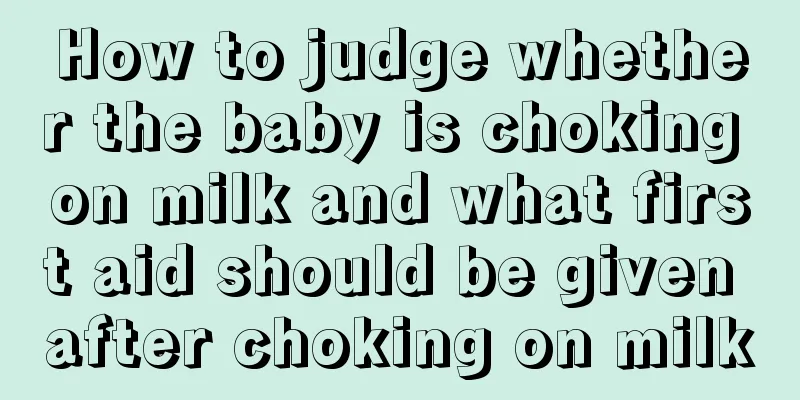How to judge whether the baby is choking on milk and what first aid should be given after choking on milk

|
It is common for newborns to choke on milk. After choking, if it is just a slight milk regurgitation, the baby will adjust his breathing and swallowing movements by himself and will not inhale milk into the trachea. Parents should carefully observe the baby's breathing condition and complexion. How to judge whether the baby is choking on milkClose observation: When mild regurgitation or spitting up of milk occurs, the baby will adjust his breathing and swallowing movements by himself and will not inhale milk into the trachea. Parents only need to closely observe the baby's breathing condition and complexion. How to give first aid after choking on milk?1. If the baby chokes on milk while lying flat, let the baby lie on his back and pat the baby's back to prevent the spitted milk from flowing into the throat and airway. 2. If the baby has difficulty breathing or turns blue, immediately let the baby lie on the adult's legs or bed, and pat the baby's back hard until the baby coughs up excess milk. 3. If you have an automatic breast pump, you can insert the hose into the baby's mouth and throat to suck out the excess milk. If you don't have an automatic breast pump at home, you can wrap gauze around your fingers and put them into the baby's mouth to suck out the overflowing milk. 4. You can pinch the soles of the baby's feet with your fingers. There is a Yongquan acupoint under the soles of the baby's feet. It would be better if the mother knew this acupoint. Be sure to stimulate the baby to cry. Crying will make the milk in the trachea spray out to prevent suffocation. 5. If the baby has a loud voice and a rosy face, then it is fine. If the baby does not cry out and has a purple face, be sure to call 120 immediately. How to breastfeed correctly1. Do not feed the baby when he is crying or laughing; do not wait until the baby is very hungry to feed him, as the baby may choke if eating too fast; do not force the baby to feed after he is full, as forced feeding may cause accidents. 2. When breastfeeding, the baby should lie diagonally in the mother's arms (upper body at 30-45 degrees), and should not lie on the bed to feed. When feeding artificially, the baby cannot lie flat, but should take a sloped position, with the bottom of the bottle higher than the nipple to prevent inhalation of air. 3. When the mother secretes milk too quickly and the amount of milk is large, use your fingers to gently press the areola to slow down the flow of milk. When feeding artificially, the nipple hole should not be too large, and when the bottle is turned upside down, the milk should flow out in drops rather than lines. 4. The mother's breast should not block the baby's nostrils. The mother must observe the baby's expression while feeding. If the baby's mouth corners overflow with milk or the area around the mouth and nose turns blue, the feeding should be stopped immediately. Babies who have choked or premature babies should be closely observed, or a doctor should be asked to guide feeding. 5. After feeding, hold the baby upright on your shoulders and pat the baby's back to help expel gas from the stomach. It is best to hear the burp before putting the baby on the bed. The head of the bed should be 15 degrees high. Lie on the right side for 30 minutes, then lie flat. Do not let the child sleep on his stomach. What is the reason for the baby to choke on milk?Improper feeding time: Improper feeding time should be the main reason for babies to choke. Because we don’t know the baby’s feeding pattern, we usually have to wait until the baby cries before feeding them. At this time, because the baby is too hungry or too emotional, he will eat milk in a hurry, which is easy to cause choking. At this time, it is possible to inhale milk into the trachea. So everyone must pay attention. If the baby is crying in an emotional state, or when he is very happy and excited, he cannot be fed. He must wait until he calms down before feeding him. In this way, it is not easy to cause choking. Everyone must pay attention and never force the baby to feed, which may have a great impact on the baby. Lack of vitamin A: Studies have found that infant choking on milk is closely related to vitamin A deficiency, and good results can be seen after vitamin A supplementation. Researchers believe that vitamin A plays an important role in maintaining the normal structure and health of skin and mucous membrane epithelial cell tissues. When infants lack vitamin A, the epithelial cells of the pharynx located in the front of the larynx shrink and keratinize, resulting in choking when swallowing because the pharynx cannot fully close and cover the trachea. Therefore, if infants often choke on milk, it is likely that the baby is lacking vitamin A. Improper feeding posture: Some young new mothers heard that lying down to feed can prevent breast sagging, so they feed their children in a lying position. Experts say that many babies choke on milk because their mothers have improper feeding postures, such as lying down to feed, which can easily cause the baby to choke on milk and cause aspiration pneumonia. So mothers should not lie down to feed their children, and they should not let their children lie down to feed. If you feed your child with a bottle, be careful not to leave air in the bottle. It is best to fill the bottle and let the air out, which can reduce the probability of the baby choking on milk. |
<<: What are the reasons why babies suddenly don't like to eat milk?
Recommend
Will ADHD affect children's intelligence? Will ADHD in children get better when they grow up?
Usually, ADHD in children is a relatively normal ...
What are the effects of regular massage on infants and young children? How to arrange the daily routine for a one-year-old baby?
Frequent massage of infants and young children is...
What is the amniotic band? Does the appearance of the amniotic band harm pregnant women?
During pregnancy, some pregnant women will have a...
Is Yunnan Baiyao toothpaste suitable for long-term use? Can Yunnan Baiyao toothpaste be used by children?
Yunnan Baiyao toothpaste can not only be used to ...
Can children get vaccinations for colds? What fruits can children eat for colds?
Many parents know that children need to be vaccin...
Can Zhenshiming Eyewash be used every day? What is the function of Zhenshiming Eyewash?
With the development of the times, eyewash has gr...
Can pregnant women eat vermicelli? Precautions for pregnant women to eat vermicelli
Vermicelli is a staple food that we often eat in ...
Can I still get pregnant if my menstrual period is dark in color?
Women need to take good care of their bodies duri...
How to calculate the safe period for women most accurately
If pregnant parents want to get pregnant safely a...
What country's brand is Super Power Laundry Detergent? How is Super Power Laundry Detergent?
Laundry detergent is a very important cleaning pr...
How much is a bottle of baby flaxseed oil? How many months does a baby eat flaxseed oil?
Flaxseed oil is a very common edible oil in our l...
What is the effect of pregnant women vomiting blood on the fetus? The difference between pregnant boys and pregnant girls
At present, many people want to know whether the ...
What kind of exercise is good for postpartum? There are many benefits of doing yoga after childbirth
The body of a postpartum mother is in a relativel...
Solutions to constipation caused by adding complementary foods to babies Benefits of adding complementary foods to babies
Usually, the stomach and intestines of babies who...
Why are children too thin? How can children gain weight?
Usually, children's stomachs are very small, ...









